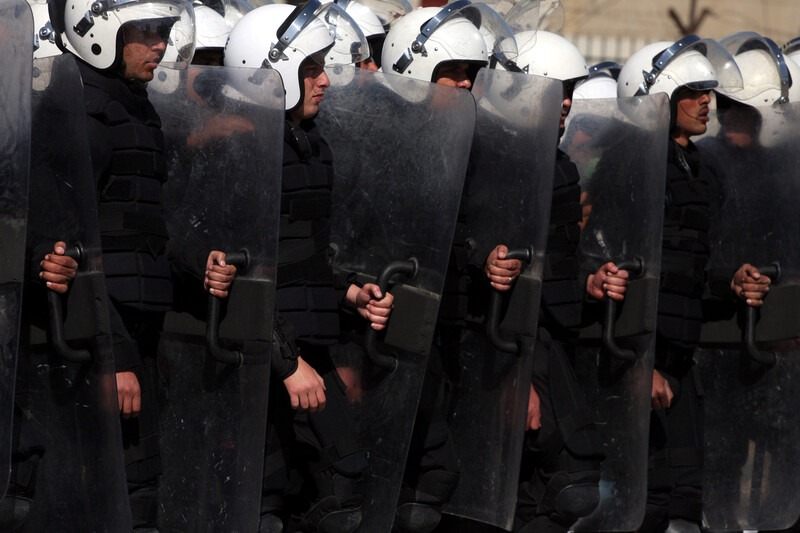The Electronic Intifada 23 October 2018

Palestinians anti-riot police deploy in Ramallah against Palestinian protesters. A new Human Rights Watch report accuses the Palestinian Authority and Hamas of running “parallel police states” in the West Bank and Gaza.
APA imagesA new report by Human Rights Watch finds both the Palestinian Authority in the West Bank and Hamas in Gaza guilty of making widespread use of arbitrary arrests and torture to quell criticism and political opposition.
The report, titled “Two Authorities, One Way, Zero Dissent,” is the result of two years of investigation. It draws on 86 case studies and 147 interviews, mostly with ex-detainees.
“Twenty five years after Oslo, Palestinian authorities have gained only limited power in the West Bank and Gaza, but yet, where they have autonomy, they have developed parallel police states,” said Tom Porteous, a Human Rights Watch representative.
“Calls by Palestinian officials to safeguard Palestinian rights ring hollow as they crush dissent.”
The arbitrary arrests are mainly aimed at those who criticize the authorities or express support for political opposition on social media, in journalism and on university campuses. According to Human Rights Watch, the authorities often justify the arrests on the basis of vague laws that criminalize activities as “causing sectarian strife” or “insulting higher authorities.”
The report gives many examples of individual cases of abuse. One man, previously jailed by Israel, was subsequently detained 15 times by the PA’s security forces for belonging to the Hamas bloc when in prison.
Another example is the 15-day detention of a journalist in Gaza who wrote on Facebook, “I wonder if the children of our leaders sleep on the floor like ours do.” He was charged with the “misuse of technology” and called “a source of sedition.”
Torture “habitual, deliberate and widely used”
The report states that torture and abuse in detention is “habitual, deliberate and widely used.” Both authorities frequently use a torture tactic called shabeh, in which detainees are confined in stress positions.
Human Rights Watch describes the methods used as “paralleling years of Israeli practice against Palestinians.”
Other documented abuses include use of electric shocks and beating with cables.
Human Rights Watch calls on the US and the European Union, which financially support the Palestinian Authority, as well as Qatar, Iran and Turkey, which support Hamas, to suspend assistance to security forces involved with widespread arbitrary arrests and torture. It also recommends that arbitrary arrests and abuse by the PA and Hamas be included in any future International Criminal Court investigation on Palestine.
Both Hamas and the PA deny that any abuse is systematic or amounts to more than limited and exceptional cases. Both authorities also maintain that such cases are investigated when brought to the attention of the authorities.
Human Rights Watch staff were unable to travel to Gaza to speak to Hamas authorities there about the accusations since Israel barred researchers from entry.
Both the Palestinian Authority and Hamas have internal mechanisms in place to file complaints against abuse by authorities. Hundreds of complaints have been filed by citizens and human rights organizations, but according to the Human Rights Watch report, only a “small minority” resulted in disciplinary action.
Rights groups in the West Bank put the Palestinian Authority – which is led by Mahmoud Abbas – under special scrutiny because of its security coordination with Israel. The PA passes intelligence and interrogation records to Israel and there have been documented cases in which Israeli interrogators told Palestinian prisoners that they received their interrogation records from the Palestinian Authority.
“There is a feeling that there can be no criticism of the Palestinian leadership because it will take the focus away from the Israeli occupation,” said Yara Hawari from the Palestinian think tank al-Shabaka.
“But we have to talk about the abuses in a way that gives the whole picture. The PA and Hamas do not exist in a vacuum. Many of the human rights abuses they commit happen under the watch of Israel, and with Israeli facilitation.”
“This abuse of power goes to show that the Palestinian leaderships are quite weak and incapable of leading their people,” Hawari told The Electronic Intifada.
“It is sad. But I think this kind of report is important because it gives the Palestinians the opportunity to think about what kind of leadership they actually want, and what comes next after Abbas, rather than who comes next.”
Annelies Keuleers is a Belgian journalist based in Jerusalem.





